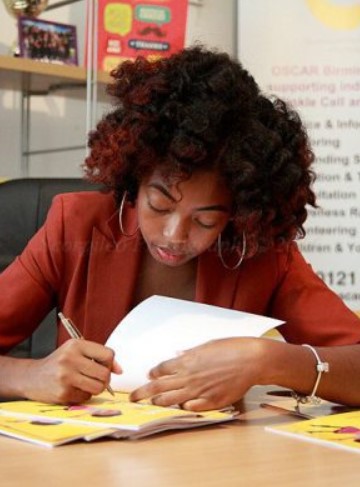
Combating a chronic disease can be challenging, especially when we don’t have the tools to combat it. Unfortunately, sickle cell disease affects 100,000 Americans a year. Furthermore, the chronic illness affects red blood cells, changing their shape and can even prevent oxygen from reaching blood cells.
It is particularly common in people with African or Caribbean family backgrounds. Even worse, 1 in 13 African-American babies are born with the disease. Even more disturbing, not much research has been done on how it affects Black patients compared to white ones.
Recently, award-winning UK author Jenica Leah decided to write the "My Friend Jen" children’s book series centered around sickle cell disease. Having suffered from the blood disease since birth, she didn’t grow up with any knowledge about the chronic illness.
Having been in and out of hospitals for most of her life, Leah decided to write books based on the challenges she faced. Now, the 25-year-old uses her books to draw awareness and help other child sufferers better understand the disease. In a sense, Jenica Leah wrote the children’s book she never had growing up.
RELATED: Chicago PD Makes 4-Year-Old Sickle Cell Patient’s Dream Come True
Jenica Leah Weathered Through The Worst Of The Disease
From birth, Jenica Leah encountered one problem after another. Growing up with sickle cell disease wasn’t easy, as it led to serious health complications, such as suffering a stroke at the age of 13 and needing a hip replacement at 25.
Despite all the hardships she’s endured living with the disease, Jenica Leah still conquers every day with a sense of purpose. Now the award-winning author of the children’s book "My Friend Jen" series, plans to drive awareness for the chronic disease that many Black children struggle with.

She Has High Hopes For Her Book Series
Back in October this year, Leah spoke with BBC about her condition and how it inspired her to write a children’s book series. She explained to the media outlet that she often felt alone in her struggle with the blood disease as a child.
“Even though I knew I had this thing called sickle cell, I didn't really know what it meant. I knew I went to the hospital, I knew I got better again, but I didn't really understand it,” she told BBC. To this day, more research needs to be done in order to understand how it affects other races, especially Black patients.
Unfortunately, the Black community has to write its own narratives in order to inspire change. Furthermore, the award-winning Birmingham author believed that by writing a children’s book series, she could give other children the confidence and peace of mind she never had growing up.

Her Books Can Help Children Describe Their Symptoms To Doctors
Specifically, her books are written entirely from the point of view of Jen’s friend. In this fashion, Jenica Leah has crafted a support system for the main character Jen, helping others to not feel alone in their struggle with sickle cell disease. Whenever we endure tough times in life, it’s always best to surround ourselves with people who we know love us. Leah hopes to involve and educate parents on the blood disease as well, so that they can better help their children.
In further talks about her hit children's series "My Friend Jen", Leah explains that many of the symptoms she describes will be easy to understand for children.
Additionally, they can use these descriptions to help identify and relay to doctors what they’re experiencing. "Things such as, 'My friend Jen has to drink a lot', 'My friend Jen has to get lots of rest', 'My friend Jen gets tired very easily'. Little things that are easily broken down to explain to people things that their friend or family member... can do to stay well,” the award-winning author tells BBC.
In addition to writing children’s books, Jenica Leah has also appeared at a few speaking engagements this past fall. Recently, Leah held a cultural workshop at Bear Book Shop, Bearwood, on Thursday, October 27th. That following Friday, she ran an online workshop on the history of sickle cell disease.
Hopefully, Jenica Leah does help thousands of Black children and others everywhere suffering from sickle cell disease. In the end, she can help save as many lives as possible.









